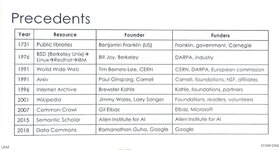ygolo
My termites win
- Joined
- Aug 6, 2007
- Messages
- 6,730

18F: We are dedicated to the American public and we're not done yet
For over 11 years, 18F has been proudly serving the American people to make government technology work better. We are non-partisan civil servants. 18F has worked on hundreds of projects, all designed to make government technology not just efficient but effective, and to save money for American...
We are dedicated to the American public.
And we aren't done yet.
March 1, 2025
A letter to the American People:
For over 11 years, 18F has been proudly serving you to make government technology work better. We are non-partisan civil servants. 18F has worked on hundreds of projects, all designed to make government technology not just efficient but effective, and to save money for American taxpayers.
However, all employees at 18F – a group that the Trump Administration GSA Technology Transformation Services Director called "the gold standard" of civic tech – were terminated today at midnight ET.
18F was doing exactly the type of work that DOGE claims to want – yet we were eliminated.
When former Tesla engineer Thomas Shedd took the position of TTS director and met with TTS including 18F on February 3, 2025, he acknowledged that the group is the “gold standard” of civic technologists and that “you guys have been doing this far longer than I’ve been even aware that your group exists.” He repeatedly emphasized the importance of the work, and the value of the talent that the teams bring to government.
Despite that skill and knowledge, at midnight ET on March 1, the entirety of 18F received notice that our positions had been eliminated.
The letter said that 18F "has been identified as part of this phase of GSA’s Reduction in Force (RIF) as non-critical”.
"This decision was made with explicit direction from the top levels of leadership within both the Administration and GSA," Shedd said in an email shortly after we were given notice.
This was a surprise to all 18F staff and our agency partners. Just yesterday we were working on important projects, including improving access to weather data with NOAA, making it easier and faster to get a passport with the Department of State, supporting free tax filing with the IRS, and other critical projects with organizations at the federal and state levels.
All 18F's support on that work has now abruptly come to a halt. Since the entire staff was also placed on administrative leave, we have been locked out of our computers, and have no chance to assist in an orderly transition in our work. We don’t even have access to our personal employment data. We’re supposed to return our equipment, but can’t use our email to find out how or where.
Dismantling 18F follows the gutting of the original US Digital Service. These cuts are just the most recent in a series of a sledgehammer approach to the critical US teams supporting IT infrastructure.
Before today’s RIF, DOGE members and GSA political appointees demanded and took access to IT systems that hold sensitive information. They ignored security precautions. Some who pushed back on this questionable behavior resigned rather than grant access. Others were met with reprisals like being booted from work communication channels.
We’re not done yet.
We’re still absorbing what has happened. We’re wrestling with what it will mean for ourselves and our families, as well as the impact on our partners and the American people.
But we came to the government to fix things. And we’re not done with this work yet.
More to come.






